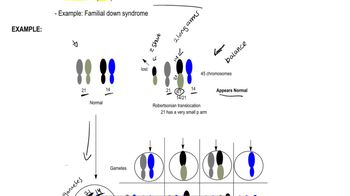Here are the essential concepts you must grasp in order to answer the question correctly.
Lynch Syndrome
Lynch syndrome, also known as hereditary nonpolyposis colorectal cancer (HNPCC), is a genetic condition that increases the risk of various cancers, particularly colorectal and endometrial cancers. It is caused by mutations in mismatch repair (MMR) genes, which are responsible for correcting DNA replication errors. Understanding Lynch syndrome is crucial for recognizing the implications of gene mutations on cancer risk and the importance of genetic testing.
Recommended video:
Robertsonian Translocations
Mismatch Repair Genes
Mismatch repair (MMR) genes, including MLH1, MSH2, MSH6, and PMS2, play a vital role in maintaining genomic stability by repairing errors that occur during DNA replication. When these genes are mutated, the efficiency of DNA repair is compromised, leading to an accumulation of mutations that can result in cancer. Knowledge of these genes is essential for understanding the molecular basis of Lynch syndrome and its associated cancer risks.
Recommended video:
Protein Function
The protein products of MMR genes are enzymes that facilitate the recognition and repair of mismatched DNA bases. These proteins work together in a complex pathway to ensure accurate DNA replication and prevent mutations from being passed on during cell division. A summary of their normal functions highlights how disruptions in these proteins contribute to the development of Lynch syndrome and its related cancers.
Recommended video:
 Verified step by step guidance
Verified step by step guidance Verified video answer for a similar problem:
Verified video answer for a similar problem:



 9:51m
9:51m